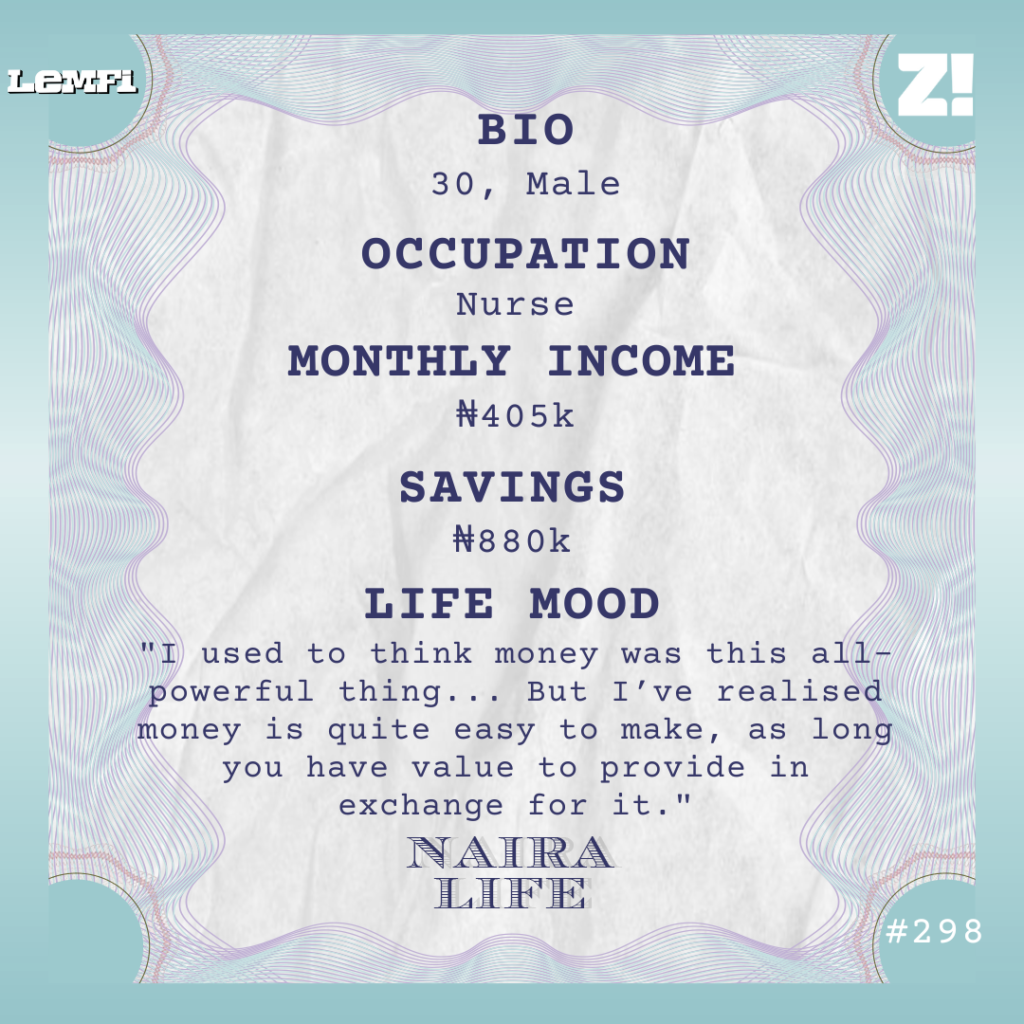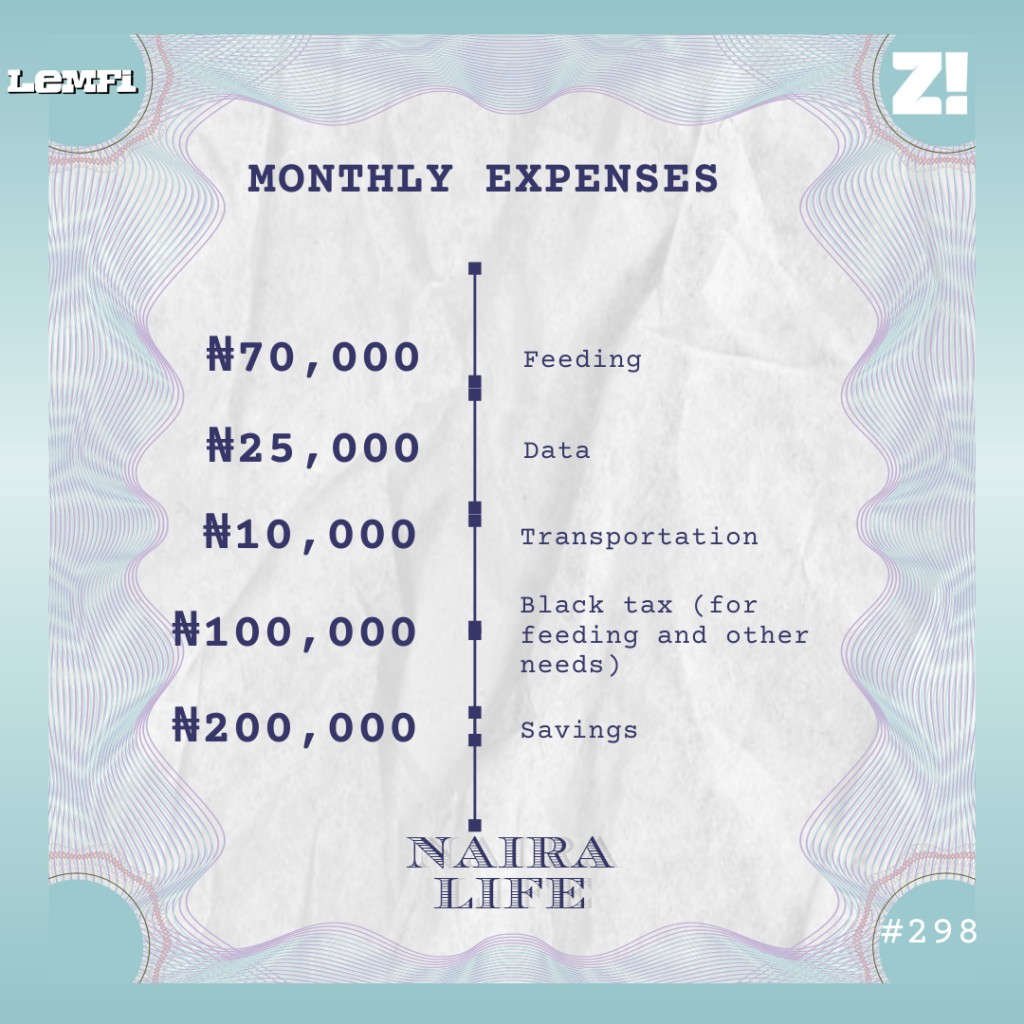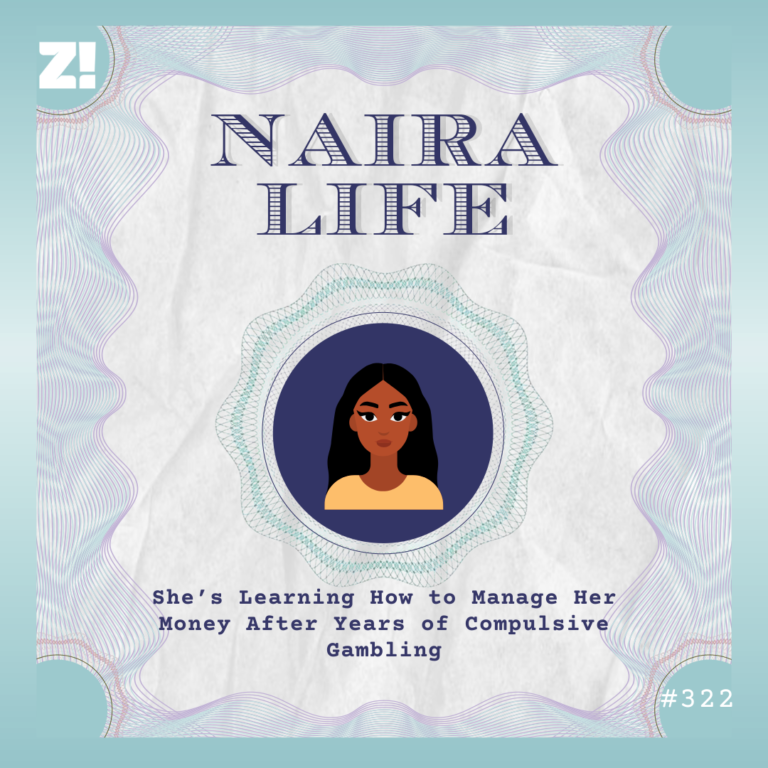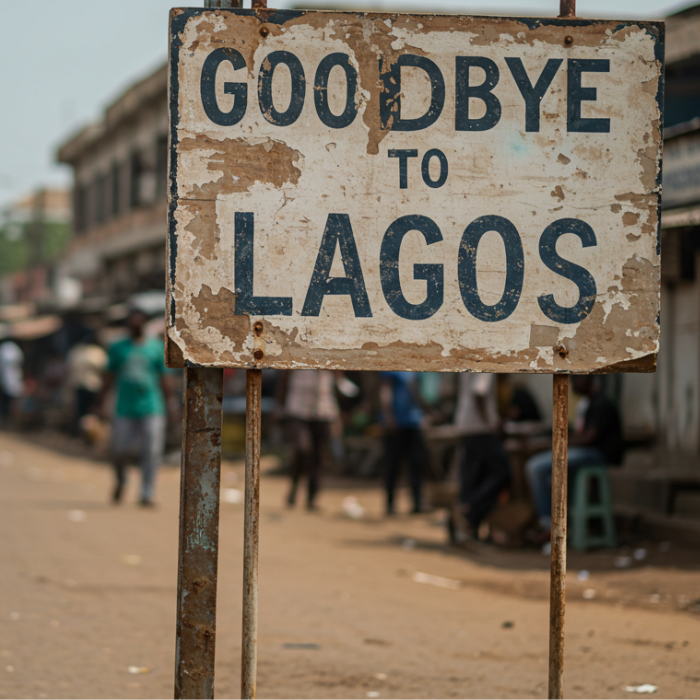Every week, Zikoko seeks to understand how people move the Naira in and out of their lives. Some stories will be struggle-ish, others will be bougie. All the time, it’ll be revealing.
LemFi is the no. 1 mobile transfer app for sending money from the UK directly to Nigerian banks within minutes at the best rates and with zero transfer fees! Sign up today and enjoy a £5 bonus for your first transfer to Naija. Download now!

What’s your earliest memory of money?
Mostly that we didn’t have it. I was eight years old when my dad lost his job at a vehicle manufacturing company, and things became so bad. We stopped eating breakfast and moved from an estate to a face-me-I-face-you apartment.
I transferred to a government school, and I remember hating the uniform so much because my bully in our old estate had a pair of shorts in the same colour. When I refused to wear the uniform on the first day of school, my mum said I had two options: go to school or hawk pure water to provide money for the house. I relented, but I still sold pure water after school.
Wait. Really?
Yup. My mum was a housewife when my dad had a job, and when the job disappeared, my dad blamed her for not bringing any income. Now that I think about it, I’m not sure what my dad did for money after he lost his job; he was just outside the house a lot.
Anyway, my mum started a small business, collecting cold pure water on credit and hawking them. When I returned from school, she’d put a bowl on my head and tell me where to go to sell the water.
For the next two years, I hawked water every day after school. Then, one day, I got hit by a car in the market. The driver left me and ran away while I lay there surrounded by shouting passersby. I might have died if my mum hadn’t come looking for me 20 minutes later. No one tried to help.
That’s crazy
The accident caused a big fight between my parents. My dad was annoyed that he had to spend his hard-earned money on hospital bills, which wouldn’t have happened if my mum had done her duty. My mum was like, “If you were doing your own duty, would we even be here?”
I suspect the whole thing caused their separation. When I returned home from the hospital, my dad had moved out. I’d just written my common entrance exams, and my mum decided she couldn’t put me through secondary school. So, she shipped me off to live with a family friend. This was in 2004.
What was living away from home like?
Slightly better. The woman and her family basically turned me into a houseboy, but at least they gave me cornflakes or golden morn for breakfast, and I didn’t have to hawk pure water. They also enrolled me in secondary school.
But I worked in that house o. I was very small as a child, but I climbed stools to wash the husband’s car. I also washed plates and hand-washed the children’s clothes. Sometimes, the woman would rub shea butter on my hands after I’d scrub them raw from washing clothes.
I still don’t understand how only two small children went through mountains of clothes in just one week. Every time I came home from school, the laundry basket multiplied, and I had to wash them clean or risk getting flogged.
Was flogging something that happened regularly?
Yeah, but I don’t think it was more than normal. It was just the woman’s way of making sure I did things quickly. And within a few months of staying with her, I knew how to gauge her mood and do what she expected to escape the cane.
I also learned how to make money from her. I started taking out ₦10 – ₦20 whenever she sent me on errands to get money for snacks in school. By the time I got to JSS 3, I’d started selling her children’s toys in school for ₦300 – ₦500 apiece.
No one noticed because the kids had many toys. Every single day, they asked for something new, and the parents bought it. This often meant they’d abandon the old toys and only play with the new ones. Then, after a while, the parents would gather the old toys and throw them away or donate them. When I noticed that, I turned it into a business opportunity.
I only got to do that for a year. The woman’s husband died when I got into SS 1, and she told my mum to come and carry me.
What did that mean for you?
Moving back with my mum showed how much our relationship had deteriorated. She’d remarried and was more interested in keeping her husband happy. It was a toxic situation. If the man complained small, she’d beat me and warn me not to try to be stubborn. I wasn’t even trying anything.
The good thing was that they paid my school fees. I basically took care of my other needs.
How did you do that?
I got a job at a cybercafe near my school in 2009. I must’ve been very convincing because I knew next to nothing about computers, but somehow, I got the job. I helped with typing, photocopies, and basically everything people do at cybercafes.
My salary was ₦6k/month, and I often abandoned classes for work. It’s a miracle I even graduated and passed WAEC in 2010. I worked at the cybercafe till 2014. My salary was ₦8500 when I left, and I had ₦35k in savings.
Why did you leave?
Problems at home. My mum’s husband felt I was proud and acting like the man of the house. Meanwhile, I was working and staying away from home until nighttime because I didn’t want to clash with him. But he had a problem with that.
My mum asked me to go live with another family friend, but I refused. I wasn’t about to do houseboy 2.0. Instead, I told a Facebook friend about my situation, and he said I could come squat with him in his parents’ house. So, I did.
I moved in, and his parents treated me like their own. I’ll forever be grateful to that family. I’d never experienced that level of acceptance before in my life. My friend’s mum would cook and ask me to go serve myself from the pot. As how?
The first time I took my friend’s parents’ clothes to wash without anyone asking, they were so shocked — almost like they didn’t expect me to do any chores. Forget, those people tried for me. They even allowed me to use their backyard to start a laundry business in 2015.
How did you land on laundry?
My friend suggested it when I complained about being broke. He was a university student and lived at home, but he had friends in the hostel who paid “any wash” guys to take care of their laundry.
It didn’t take much to start: I hand-washed the clothes, spread them in the backyard, and ironed them. I only had to buy soap and get water from Mai Ruwa when there was no light to pump water.
My first clients were my friend’s classmates. Then, I started hustling for customers in the hostels. I charged ₦200 per clothing item and ₦250 for items like bedsheets and blankets. In a week, I made between ₦5k – ₦6k.
By 2016, I could afford a ₦35k washing machine and dryer. In 2017, I secured a ₦60k/year shop to use as a proper office. My clients also expanded to working-class people, not just students. Business was good, and I often made ₦25k/week.
What were your expenses like?
Most of my expenses were for business operations. I also began chipping in at my friend’s place, paying light bills and dropping money for food. I wasn’t buying anything for myself or splurging — maybe because I knew how much I struggled to make money. So, I saved whatever I had left.
Between 2018 and 2020, I got two more washing machines and employed an assistant to canvas for customers and help with the laundry. I paid him ₦12k/month. By then, I was sure of at least ₦80k/month.
Business slowed down in 2020 because of the pandemic, and I began looking for other options. My friend’s dad suggested I gather my savings and invest it in a certificate — for backup. School was the last thing on my mind, but I respected him a lot and couldn’t throw his advice away. Plus, he introduced me to his friend, who was a key non-academic staff member at a nursing school, so admission was sure.
But did you want nursing?
Not really, but my friend’s parents convinced me that it was a respected and lucrative profession. I wasn’t dull in secondary school, so I knew it was something I could do.
I got admission that same year and had to move because the school was in a different state. I paid about ₦200k for the form, acceptance fee, tuition, and another ₦80k for hostel fees. I sorted all of these payments from my savings. I had about ₦400k in my savings account from all the years running my business and the sale of my washing machines, so that came in handy.
How did you handle subsequent school fees, though?
It was just the grace of God because I can’t point out one thing. Nursing school was expensive; we were always buying one instrument or uniform or travelling for one clinical posting or the other. I tried to resume my laundry business by offering to wash my classmates’ clothes, but they were mostly women and washed by themselves.
I tried different hustles like writing assignments and projects, but the money I made was only enough for food. I think I still had some money in my savings to pay second-year school fees, and my friend’s dad supported me with part of it. He also sent me ₦50k for the final year school fees, and I gathered the remaining ₦50k to complete the payment.
After every every, I graduated in 2023.
Whoops! Congratulations
Thank you. The journey was tough. I returned to my friend’s parents and got a job at a hospital. My salary was ₦80k/month, and I remember asking myself, “So, I spent all that money at nursing school to come back and earn the same thing I did as a laundryman?”
But six months into the job, I got another job at a hospital that only required me to come in at night thrice a week. They paid ₦95k. I juggled both jobs till July 2024, when I got a job at an NGO for ₦405k/month.
That’s quite a jump
I still can’t believe it myself. Remember the non-academic staff member my friend’s dad introduced me to? The man took a liking to me because I never visited him empty-handed — I always went with a bottle of wine or a tie — and we kept in contact.
He told me about the job, so I applied and got it. I feel like his referral helped a great deal because I doubt a nurse with just about a year’s experience would get that kind of opportunity.
Has your income growth come with any lifestyle changes?
Honestly, I still see myself as a struggling man. I don’t spend money like someone who has it. I carefully examine my expenses and spend on myself when it’s absolutely necessary. My approach to finances is: save first, spend later.
I still live with my friend’s parents. There’s no point in renting an apartment when I don’t have a woman I want to marry. I’m hardly home because I often travel for work, and my primary work base in the north comes with free accommodation, so why get another place? Plus, the family loves having me around. All their children are grown and have moved away, and I keep them company.
However, whether I’m home or not, I send them money for feeding expenses and utility bills. I also dash them money sometimes. Considering all they’ve done for me, it’s the least I can do.
What do these expenses look like in a typical month?

My transportation expenses are low because my company pays for my travels. Sometimes, I hardly touch my salary because I get per diem allowances whenever I travel.
What do you do with your savings?
I just keep them in a savings app that yields monthly interest. Right now, I have ₦880k, and I’m considering buying a piece of land when it hits ₦1m. This should happen before the end of the year. Maybe by next year, I’ll look into other investment channels like stocks. I just want to have something solid with my money first.
How has your journey with money shaped how you view it?
Money has shaped how I view life. I used to think money was this all-powerful thing, considering how it scattered my family. But I’ve realised money is quite easy to make, as long you have value to provide in exchange for it. Of course, inflation and the economy are turning everything upside down right now, but I think the principle of value exchange still stands.
What’s something you want but can’t afford right now?
Marriage. I don’t have someone yet, but even if I did, I don’t think I have everything I need. For one, I hope to have a safety net of at least ₦2m to set up a home, and I’d also like to have started building a house before marrying a woman.
Because when a wife comes, children can come soon after. I don’t want to be caught up in the day-to-day expenses of running a household and not have resources left for a basic investment like a house.
Fair. What’s your financial happiness on a scale of 1-10?
9. I never imagined I’d be where I am so soon in life. The only reason it’s not 10 is because I still have things I hope to achieve.
If you’re interested in talking about your Naira Life story, this is a good place to start.
Find all the past Naira Life stories here.






